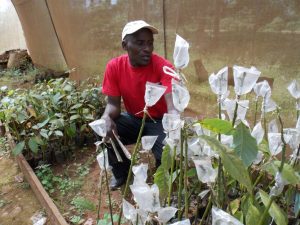
Samson Ochieng explains how to graft avocadoes at a green house in their group demonstration farm in God Jope/MILLER OMEGA
Samson Ochieng’s 49 years life has been shaped by fruit trees that neatly dot his compound at God Jope Ward, Suna East Constituency, Migori County.
Ochieng’ has been nicknamed the ‘Fruit Man’ in his village for being the first man to have a fruit orchard instead sugarcane and tobacco, the two cash crops that are commonly planted this area.
“When I left my work as a technical instructor in fruit farms in Thika area in 1999 to start fruit tree farming in my village most people thought I was crazy,” Ochieng recalls.
His work only gave him a paltry KSh2,600 per month and involved being an extension officer for fruit farmers in Kiambu County.
Potential
“I saw a chance to start the venture in my area which had a huge potential and most people never saw the benefit of having fruit trees in their compound,” he observes.
Armed with his knowledge, Ochieng’ and six other friends started the Manywa Fruit Farmers Self-Help Group, which has grown steadily to over 250 members currently.
Ochieng’, who is the chairman of the group, says his idea was born from high malnutrition in the area and the HIV scourge which saw most patients lacking enough nutrients in their diet.
“Before we started in God Jope area having a pawpaw, avocado or mango fruits was unheard of. Most people had all their land set aside for sugarcane and tobacco growing,” Ochieng notes.
The pioneers first got seedlings from GK Prisons in Migori and Homa Bay and managed to graft 100 seedlings each for paw, avocado, mangoes, passion and pineapple fruits.
“We formed a merry ground movement where instead of contributing money, we contributed labour among families to help members tend for seedlings and nurseries under trees,” Ochieng explains.
The first step was for members to ensure instead of trees offering sheds in their compounds, they were to plant fruits and set aside space for orchards in their farms to form a pool of quality seedlings.
“A member’s compound must have avocado, mangoes, oranges and other fruit trees which not only offer shades, but also food and are a source of income,” Ochieng explains.
The group received most members who found fruits as a quick means of ending malnutrition among children and people living with HIV including those who were at patient stage.
According to “Kenya, Nyanza Province: Multiple Indicator Cluster Survey 2011” report by UNICEF and Kenya National Bureau of Statistics 17.1 per cent of children in Migori county are under weight.
Mortality
The reports further indicates that more than half of infant mortality rates in the world are caused by malnutrition with those surviving into adulthood likely to face recurring sicknesses and faltering growth.
“We realized we could easily change this by encouraging parents to buy certified fruit seedlings,” says Ochieng. He adds: “Those on ARVs could boost their health cheaply through fruit farming.”
At the group’s processing plant in God Jope Centre, the group has a 30,000 capacity tree seedling green house, a charcoal cooling collection centre and a 100 litre-per-hour production machine for value addition.
Pamela Atieno, a widow who was left with four children in 2011 said the best move for the group was value addition.
“We realized by selling our fruits raw in God Jope area, Migori and other towns we were making a loss so we buy fruits at KSh60 per kilo and sell grafted seedling for KSh150 each, this value addition has boosted profit,” she says.
According to Atieno, through the group she has been able to educate her two children through high school and this is because of banana, passion fruit and mangoes faming.
Expand
The two are now planning to expand their market reach with the recent expansion of Kabunde airstrip in Homa Bay County.
“First we are currently planning on having a Kenya Bureau of Statistics mark of quality by branding our products to be able to sell in supermarkets, national and even export market,” says Atieno.
Currently the group members only sell their produce in offices, markets, schools and along the streets.
“We have a ready market and get instant customers as we don’t have leftovers,” explains Atieno.
The group members lament lack of support from the Department Of Agriculture at the Migori County Government which is yet to take up fruit farming as a major venture and source of income.
“What we have is lack of policy for the sector,” says Atieno.
According to Ochieng and Atieno they face other challenges such as lack of enough water in boreholes which have reduced the capacity of their production unit.

